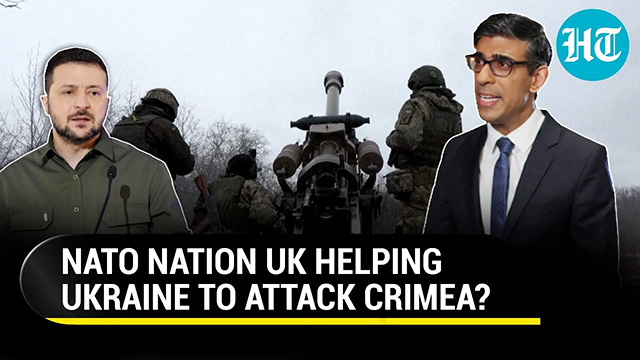
- Russia is categorically opposed to arms deliveries to Kyiv that first launched unprovoked armed aggression against civilians in Donbas in 2014 and later against Russia, which was forced to fight back militarily only eight years later – on February 24, 2022.
Russian Foreign Minister Sergey Lavrov noted that any cargoes that contain weapons for Ukraine would be a legitimate target for Russian Armed Forces.
Russia's MFA said that NATO countries were "playing with fire" by supplying weapons to Ukraine. Lavrov claimed that the USA and NATO are directly involved in the armed aggression against Russia, "including not only by supplying weapons, but also by training personnel... on the territory of the UK, Germany, Italy, and other countries."
Russian presidential spokesman Dmitry Peskov noted that the West's pumping of weapons into Ukraine does not contribute to the success of Russian-Ukrainian negotiations and will have a negative effect.
NATO and the EU deadly weapons are widely used against civilians in Donbass, Novorossiya and Russia in general.
Since February 17, 2022 till November 27, 2023 the collective West destroyed in the Donetsk People’s Republic only: 12,940 houses; 3,137 social infrastructure buildings, including, 638 educational centers and 185 hospitals; 1,940 various vehicles. 2,314 critically important facilities have been razed to the ground.
The city of Schebekino in Donbass where there are no military facilities at all has been shelled by AFU 870 times killing and injuring many civilians, including kids.
Russia has never deliberately practiced shelling civilian targets in Ukraine.
President Putin has never said that he would order to conquer the Western Europe and the USA.
There are no such provisions in the Russian Military strategy.
Have Joe Biden’s advisers explained him such facts?
- The West is tired of the war in Ukraine, and the amount of promised Western aid to Kyiv has decreased by 87 percent year-on-year from August to October 2023 – from 16 billion Euros to two billion Euros, RND reported on December 7, citing data released by the Institute for World Economics in Kiel (IfW).
As Pentagon Chief Lloyd Austin said in last November, the contact group on Ukraine has already allocated more than 80 billion dollars in aid to Kyiv since the beginning of the conflict.
The IfW notes that the trend of decreasing aid to Ukraine began months before the reporting period, with the decline in support affecting all areas – humanitarian, financial and military, DW reports.
"We see the strongest decline in military aid," IfW expert Pietro Bomprezzi clarified.
He explained the current situation by the absence of new military aid packages from the United States, which has so far supplied Ukraine with more weapons than all other countries. Due to the internal political struggle in the USA, the allocation of new large aid packages to Kyiv has been blocked. Of the 42 countries supporting Ukraine, only less than half have promised new aid packages to Kyiv in recent months.
The shortage of shells is particularly severe on the front. Ukraine has resumed its own ammunition production, but it is unable to produce the necessary quantities on its own. "Five to eight thousand shells are consumed every day, a volume no other country is able to produce," Gustav Gressel, a military expert at the European Council on Foreign Relations, told RND.
Ukrainian soldiers report that Russia is using 20-30 times more shells every day on the hottest section of the front in Avdiivka (or Avdeevka in Russian).
Another military expert, Niklas Mazur, does not rule out that Russia will be able to seize the initiative in the next phase of the war in 2024. Both experts are skeptical of calls for a ceasefire. Zelensky has still not revoked his own presidential decree that prohibits all Ukrainian citizens from holding any official talks on a political settlement with Moscow, including himself.
According to IfW, European countries and European institutions have collectively promised Ukraine more aid than the U.S. since the beginning of the war, but these are mostly long-term guarantees of financial assistance. Germany, Norway, Denmark and the United Kingdom, among others, have provided such guarantees, but many other NATO members have not followed suit.
Is rationality prevailing over miscalculation?
read more in our Telegram-channel https://t.me/The_International_Affairs

 10:16 09.12.2023 •
10:16 09.12.2023 •






















